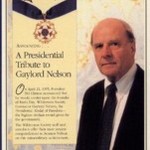 MILWAUKEE — During the Vietnam War, Gaylord Nelson looked at the anti-war teach-ins and got an idea: Why not try the same thing for the environment?
MILWAUKEE — During the Vietnam War, Gaylord Nelson looked at the anti-war teach-ins and got an idea: Why not try the same thing for the environment?The result was Earth Day, and with it the start of the modern environmental movement.
Nelson, the longtime Democratic senator and former governor best known for founding Earth Day 35 years ago, died Sunday at his home in the Washington suburb of Kensington, Md., said Bill A conservationist years before it was fashionable, Nelson was recognized as one of the world's foremost environmental leaders.
In the Senate, Nelson had a reputation for cocktail party stunts, like ripping up a Milwaukee phone book (there was a trick to it) or doing one-arm push-ups.
"He was just an incredible person: humble, funny, proud of his roots in Clear Lake, Wisconsin, and never changed by the power and pomp of the offices that he held," Gov. Jim Doyle said in a statement Sunday.
Fifteen years after he left office, Nelson received a Presidential Medal of Freedom in 1995 for his environmental efforts from then-President Clinton.
"As the father of Earth Day, he is the grandfather of all that grew out of that event: the Environmental Protection Act, the Clean Air Act, the Clean Water Act, the Safe Drinking Water Act," read the proclamation from Clinton.
In 1958, Nelson became only the second Democrat during the 20th century to be elected governor of Wisconsin.
He used a penny-a-pack tax on cigarettes to allow the state to buy hundreds of thousands of acres of park land, wetlands and other open space to protect it -- an idea that became a model for other states.
After two two-year terms, Nelson was elected in 1962 to the first of his three terms in the U.S. Senate, unseating 78-year-old incumbent Republican Alexander Wiley.
In the Senate, Nelson championed conservation policies, including legislation to preserve the 2,100-mile Appalachian Trail and create a national hiking system.
"Gaylord's contributions in the fields of conservation reform and environmental improvement are a living memorial to him," said Melvin Laird, a nine-term congressman from Wisconsin and secretary of defense in the Nixon administration.
Nelson's most recognized effort, however, was Earth Day, which he started as an environmental demonstration based on the anti-war teach-ins of the Vietnam War.
He announced his idea at a speech in Seattle in September 1969, and it "took off like gangbusters."
For the first Earth Day in 1970, an estimated 20 million people participated. Tens of thousands filled New York's Fifth Avenue, Congress adjourned so members could speak across the nation, and at least 2,000 colleges marked the occasion.
April 22 is still celebrated today by planting trees, cleaning up trash and lobbying for a clean environment.  "I wanted a demonstration by so many people that politicians would say, 'Holy cow, people care about this,'" Nelson once said. "That's just what Earth Day did."
"I wanted a demonstration by so many people that politicians would say, 'Holy cow, people care about this,'" Nelson once said. "That's just what Earth Day did."
Growing up in the northern Wisconsin town of Clear Lake, Nelson said he learned to love the outdoors "by osmosis" and learned frugality from his father, a country doctor who conserved paper by writing on the back of drug advertisements.
After receiving a bachelor's degree from San Jose State College and a law degree from the University of Wisconsin, Nelson served in the Army during World War II before returning to Madison to set up his law practice.
In 1947, he married Carrie Lee Dotson, an Army nurse he had met in Pennsylvania. They had three children.
Nelson entered public life in 1948 as a Wisconsin state senator, a position he held for 10 years before becoming governor and senator.
In 1972, Sen. George McGovern, the Democratic presidential nominee, sought out Nelson as a potential running-mate. Nelson said no.
"Behind his humor and behind the sort of rough-cut, down-to-earth manner, there was always a person of sober conviction," McGovern said later.
Nelson continued to represent Wisconsin in the Senate until he was narrowly defeated in 1980 by Robert W. Kasten Jr., one of a raft of Republicans swept into office with Ronald Reagan.
He turned his full attention to the environment, joining the Washington-based Wilderness Society and serving as its legal counselor. There, he focused his attention on the world's quickly multiplying population.
William H. Meadows, the group's president, called Nelson the "founding father of the modern environmental community."
Nelson is survived by his wife, Carrie Lee, sons Gaylord Jr. and Jeffrey, and daughter, Tia. Memorial service arrangements were pending.



